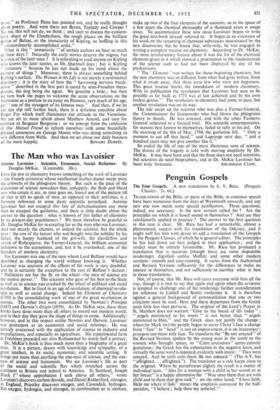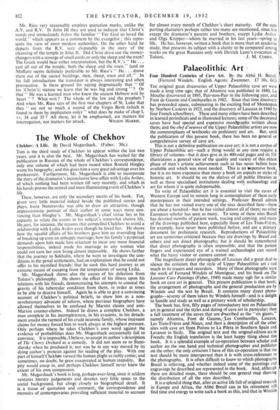Penguin Gospels
The Four Gospels. A new translation by E. V. Rieu. (Penguin Classics. 2s. 6d.) TRANSLATIONS of the Bible, or parts of the Bible, in common speech have been numerous from the days of Weymouth onwards, and any new one now needs some special justification. Three questions, indeed, are necessary. Is the new version called for ? Are the principles on which it is based sound in themselves ? And are they satisfactorily applied in practice ? The answer to the first question in this case is clear. Mr. Rieu has had a remarkable, almost a phenomenal, success with his translation of the Odyssey, and it might well fire him with desire to add a translation of the Gospels to the Penguin Classics, of which he is general editor. The principles he has laid down are best judged in their application ; and the verdict must be entirely favourable. Mr. Rieu has produced a translation that is accurate (though there are some disputable renderings), dignified—unlike Moffatt and some other modern versions—smooth and easy-running. It varies from the Authorised and Revised Versions sufficiently for the differences to make an interest in themselves, and not sufficiently to sacrifice what is best in those translations.
Not, of course, that Mr. Rieu will carry everyone with him all the way, though it is true to say that again and again when the reviewer is tempted to challenge one of his renderings further consideration (or reference to Liddell and Scott) vindicates it. It is therefore against a general background of commendation that one or two criticisms must be read. Here and there departures from the Greek seem little less than perverse. The original of the Lord's Prayer in St. Matthew does not warrant "Give us the bread of life today" ; " angels ministered to his wants " is not better than " angels - ministered to Him," and the Greek does not justify the change ; where (in Mark xiv) the people began to cover Christ's face a change from "face" to "head" is not an improvement, it is an inaccuracy ; prosopon can mean only face. To transform the "Be not amazed" of the Revised Version, spoken by the young man in the tomb to the women who brought spices, to "Calm yourselves" seems entirely gratuitous ; the Greek has the exhortation in the negative form, and virtually the same word is repeated, evidently with intent : "They were amn7Pd. And he saith unto them, Be dot amazed." (The A.V. has "affrighted ... affrighted.") The translator as a rule keeps close to the original. Where he paraphrases slightly the result is a matter of individual taste. "Alas for a woman with a child in her womb or at her breast" is a happy alternative for "Woe unto them that are with child and to them that give suck" - on the other hand, "I have faith. Help me where it fails" misses the emphasis conveyed by the half- paradox, "I believe ; help thou my unbelief." Mr. Rieu very reasonably employs quotation marks, unlike the A.V. and R.V. In John 111 they are used to indicate that Christ's words end immediately before the familiar " For God so loved the world," which appears as a comment by the evangelist ; this repre- sents the view of most modern authorities. On the other hand he departs from the R.V. very disputably in the story of the cleansing of the temple in John II. Did Christ drive out the money- changers with a scourge of small cords, or only the sheep and the oxen? The Greek would bear either interpretation, but the R.V.'s " He ... cast all out of the temple, both the sheep and the oxen," (and so Moffatt) seems definitely preferable to Mr. Rieu's " He . . . drove them out of the sacred buildings, men, sheep, oxen and all." In his full introduction the translator is always interesting and often provocative. Is there ground for saying dogmatically that " Of his [Christ's] stature we learn that he was big and strong " ? Or that " He was a learned man who knew the ancient Hebrew writ by heart " ? What writ ? The whole of the law and the prophets ? And when Mr. Rieu says of the first two chapters of St. Luke that they " are not so much a record of the Virgin Birth (which is found in them by implication only) " what does he make of chap I, vv, 34 and 35 ? All these, let it be emphasised, are matters for interrogation, not matters for attack. WILSON HARRIS.



































 Previous page
Previous page